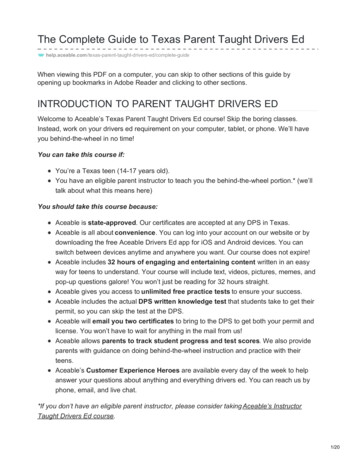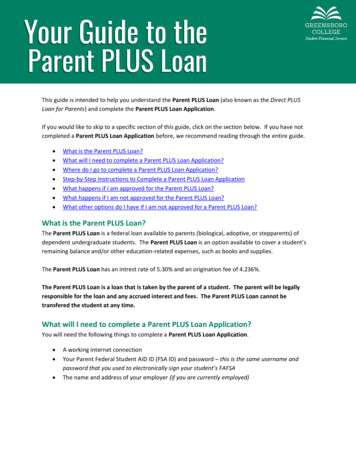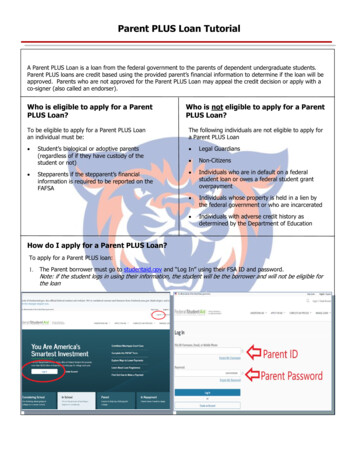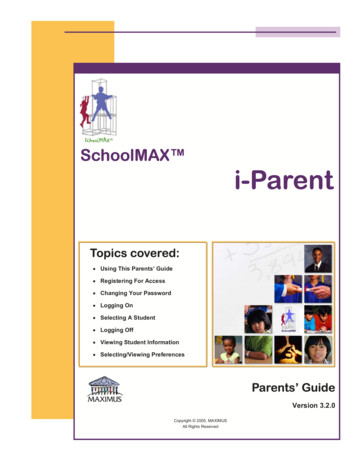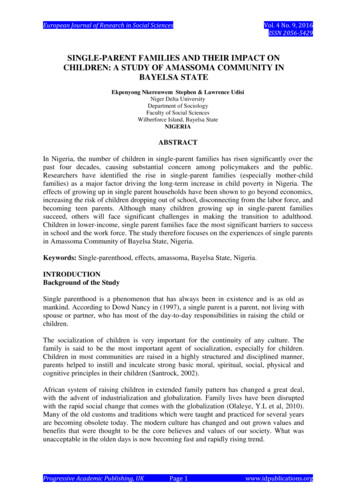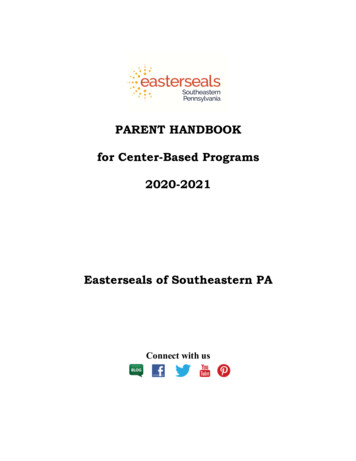
Transcription
PARENT HANDBOOKfor Center-Based Programs2020-2021Easterseals of Southeastern PAConnect with us
August, 2020Dear Easterseals Parent,We welcome you to the beginning of our new Easterseals program year. Obviously thepandemic has had huge impact on all of us and our new program year will look different thisyear. However, whether your child is enrolled in our Approved Private School, Preschoolprogram, or is to receive home or community-based intervention, all of us - administration,staff and volunteers – continue to strive to be of help to your child and your family.Your child’s development in our program is our primary concern. As you know frommeeting with some of our teachers and therapists, our academic curriculum isindividualized for each child. And, as a parent, you are an important member of the team aswe work together to set goals and work with your child to achieve them.Good communication will enable us to work closely to maximize your child’s progress. Wehope you will take advantage of the many communication and information vehicles availableto you in order to maintain the relationship between home and the Easterseals program. Weencourage you to call or send notes whenever you have a question. All of us – teachers,therapists, social workers, and administrative staff – welcome your inquiries. We alsoencourage you to participate in Back-to-School events, training opportunities, and parentsupport meetings, as well as Easterseals fund raising events.There may be times when you do not understand the reason for a policy or procedure orperhaps you would like to see a change in your child’s program. You should not hesitate todiscuss your concerns with any member of your child’s team. Please also remember thatour door is open and we hope that you feel free to discuss any issues or concerns with us.We look forward to an interesting and fulfilling year of working with you and your child.Watching your child grow and acquire physical, social, cognitive, communication and socialemotional skills will be exciting for all of us.Welcome!Carl G WebsterCarl G. WebsterExecutive Director/CEOPage 2
AGENCY MISSIONThe mission of Easterseals of Southeastern Pennsylvania is “to provide exceptionalservices to ensure that all people with disabilities or special needs and their familieshave equal opportunities to live, learn, work and play in their communities.”Easterseals staff fulfills this mission by incorporating these values into their work asthe foundation of Easterseals and a guide to our actions:IntegrityWe conduct business ethically, and with a commitment to moral integrity. We expectpeople to hold a high moral standard. When faced with an ethical dilemma, we dowhat is right, regardless of the consequences.RespectWe respect each other. We value the uniqueness and dignity of each individual, andappreciate the strength of diversity and inclusion.Shared PurposeWe share a sense of purpose. We have an enthusiastic sense of mission. We believethat to better meet our mission, we must work as a unified organization.ExcellenceWe value excellence. We value people who get involved and show a sense of urgency.We believe it takes excellent, confident and accountable people to create innovativesolutions that are valued by the people we serve.ResponsivenessWe strive to continually understand and proactively respond to the increasing andchanging needs of the people we serve as well as those who pay for the services.Page 3
PHILOSOPHY OF THE SCHOOLThe intent of our school program is to maximize each child’s ability to benefit from aneducational experience that addresses the “whole child” - their cognitive development,socialization opportunities, ability to communicate effectively with others, and physicalneeds.Our school program strives for programming which integrates therapeutic interventionwith the acquisition of educational goals through a model of integrative programming.Integrative programming is a process which occurs when parents, teachers, andtherapists have a coordinated approach to the use of therapeutic techniques and theimplementation of goals throughout the naturally occurring routines in a child’s day.The expectation is that staff is accepting of family values, concerns, and priorities, andthat these needs are taken into consideration in the development of individualizededucation plans.It is important for all children to be accepted by their peers and to feel a part of thelarger community outside of their school environment. To give our children theopportunity to interact and develop relationships with their typical peers, we continue toseek out inclusive opportunities within our own classrooms, or with other communitypreschool and school age programs. Our goal is to develop activities that allow thechildren enrolled in Easterseals to learn and play together with their peers.NATIONAL ACCREDITATION AND STATE REGULATIONEasterseals values the validation of quality provided by national and regional accreditingor regulatory bodies. Some of our center-based educational programs located inEasterseals facilities hold accreditation from the National Academy of Early ChildhoodPrograms. This is a division of the National Association for the Education of YoungChildren (NAEYC) that administers the accreditation system. The aspects of ourprograms that are evaluated include: children (relationships, curriculum, teaching,assessment of child progress, and health); teachers; family and community partners;and program administration (physical environment and leadership and management).Easterseals programs are also regulated by the Office of Child Development and EarlyLearning. As such we participate in periodic compliance monitoring activities and alsofollow the State’s Early Learning Standards for Infant, Toddler, and Pre-Kindergartenprograms.Most Easterseals programs have been designated as Keystone STARS programs.Keystone STARS designation varies by program. This is a state-wide system whichassigns programs to a STARS level which is indicative of their demonstration of qualityindicators.Programs which operate child care programs also either maintain licensure with theDepartment of Human Services as Child Care centers or Private Academic Licensure.Page 4
GOALS FOR YOUR CHILDThe goal of Easterseals school programs is to provide your child with an appropriateeducational program with state-of-the art techniques, and to assure a successfultransition to the next step in his/her education.To accomplish this goal, the following strategies are used: Educational and therapeutic goals are integrated in the school and homeprogram to enable the child to become as independent as possible.Activities that stimulate cognitive, physical, sensory, communication, social andemotional development are the focus of our planned learning program.A coordinated team works with each child. The team may include one or more ofthe following:TeacherPhysical TherapistOccupational TherapistSpeech TherapistMusic TherapistSocial WorkerAssistive Technology SpecialistTeacher Assistants/AidesPhysical Therapy AssistantOccupational Therapy AssistantNurseBehavior SpecialistGOALS FOR THE FAMILYOur goal is to involve parents fully as team members in planning, implementing, andadding to your child's individualized program.To accomplish this goal, the following strategies are used: Family members (parents, grandparents, aunts, uncles) are welcome to observethe programs and to attend parent meetings. Please check with the ProgramDirector regarding any observation procedures.Parents are encouraged to communicate freely by telephone, by notes sent withtheir child and/or by prearranged conferences. If you prefer to communicate viae-mail, please check with your child’s team.Parents actively participate in developing their child's individualized program.The staff welcomes collaboration and consultation with parents to ensure thebest possible program for each child.Page 5
THE EASTERSEALS SCHOOL PROGRAMEDUCATION: The Easterseals School is an educationally based program combinedwith therapeutic support services designed to enhance the academic services. Ourclassrooms are led by certified teachers who assess each child to determine his/herlevel of knowledge and readiness/ability to learn. The teacher leads a team of therapistsand the child’s parents to develop specialized teaching strategies for each child. In thisway, each child has a wide range of learning experiences/opportunities appropriate totheir developmental level.EVALUATION PROCEDURES: An evaluation and initial Individualized EducationProgram (IEP) is developed by the agency that refers your child to our school program.This agency can be an Intermediate Unit or School District. In preparation for yourchild's initial IEP, your child is evaluated by at least one educational or therapyprofessional. All areas of development are addressed. An Evaluation Report (ER) is thencompiled which includes the reason for referral, history or update of educational, socialand physical status of the child, a summary of evaluation findings, and conclusion andrecommendations regarding eligibility and programming needs. Data collection andreview of progress will determine when further assessment is needed. The team workingwith your child will continue to collect information about your child's progress, and thisinformation will be shared with you.Parents of an eligible young child have the right to obtain an independent educationalevaluation. Please refer to your copy of the Procedural Safeguards Notice for moreinformation about independent educational evaluations.YOUR CHILD'S IEP: An IEP is an Individualized Education Program for children agedthree years and older who are eligible for early intervention services. This is a plan formeeting your child's special learning needs written by you and your child's Eastersealsteam. The IEP addresses some very important things about your child and what s/hewill be doing in school.A review of each child’s program plan is scheduled annually. Easterseals will beinvolved in the development and annual review of your child's IEP, once they areenrolled in our program.The frequency of therapy provided during school is based upon your child's educationalneeds. The term educational needs refers to the amount and type of therapy requiredfor your child to participate in his/her educational program, and will be different thanmedically-based therapy needs.The IEP addresses these questions:What skills and abilities does my child have now?What can I expect my child to be taught this year?What are the strategies or specially designed instruction that will be used to helpmy child accomplish these learning goals? How will my child's learning progress be measured?Your child's program plan has information in it to answer each of these questions andwill be used by everyone working with your child. Page 6
POSITIVE BEHAVIOR SUPPORTS: Easterseals is a member of the State’s PositiveBehavior and Intervention Support (PBIS) network. PBIS is a framework for supportingthe social and emotional development of our students. The goal of implementing PBISis to create an environment where every child feels good about coming to school. Thisis accomplished by designing classroom settings that promote engagement and bybuilding positive relationships among students, families, and school staff. Throughthe process of PBIS, classroom staff will work together to ensure that childrenunderstand behavior expectations, receive instruction in social skills, and those withthe most persistent challenging behavior receive individualized assistance. We willuse positive approaches when addressing behaviors that interfere with learning. Allstaff will receive foundation training in PBIS and each of our Easterseals Divisionshave established/will establish Core Leadership Teams to provide ongoing support tostaff and families regarding PBIS.Here are a few examples of what to look for in our programs implementing PBIS: Emphasis on building caring, responsive relationships with students andfamilies. Behavior expectations and rules posted in common areas and classrooms.Behavior expectations and rules are developmentally appropriate and focus onteaching our students what to do (rather than what not to do). Safe classroom environments that are designed to promote positive socialinteractions. Positively stated directions and language are used by all program staff. Wefocus on teaching our children by using positive language such as "walkingfeet," "quiet voice," and "hands to self." Visual aids to assist students are used throughout the day. These may includevisual schedules, visual timers, and pictures to remind students of appropriatebehavior. Emphasis on social emotional skills and development of social skills. Friendshipbuilding, emotional vocabulary, anger management, and coping/problemsolving skills are incorporated in large and small group activities. For complete information on Easterseals Policy on Positive BehaviorIntervention Supports (PBIS)/Discipline, please see attached Appendix #1.INTEGRATED PROGRAMMING: Teachers and therapists work together to planclassroom activities which incorporate therapy goals. If therapy is part of the routinesof the classroom, these goals can be addressed at many times throughout the day. Inthis way, a team works closely and cooperatively in planning, developing strategies, andimplementing activities to reach desired outcomes for each child. In addition to anintegrative approach to programming, there may be times when, based on the individualneeds of the child or the skill being learned, a child will need to leave the on-goingclassroom activity to be seen individually by a therapist.Page 7
ACCESS TO RECORDS: Easterseals recognizes the family’s educational right to review,inspect and copy any educational records related to their child's program here atEasterseals. Easterseals will comply with any written requests from parents within fiveworking days. Easterseals can release any records that were created by our agency foryour child which would normally include the IEP, therapy and/or educationalevaluations, attendance record, and Monthly Service Reports which document therapyprovided and progress.CONFIDENTIALITY: Easterseals respects the privacy of each family we serve andadheres to strict confidentiality guidelines. These include regulations which govern theexchange of educational records (FERPA - Family Educational Rights and Privacy Act)and those which deal with protected health information (HIPAA-Health InsurancePortability and Accountability Act).MANDATED REPORTING: Under federal and state laws, Easterseals is required toreport any suspected cases of child abuse and/or neglect, and to report any incidentsthat involve client health and safety. If an investigation is required by State law, it willbe conducted by a Certified Investigator.For more information about mandated reporting, please check the Keep Kids Safewebsite at www.keepkidssafe.pa.gov/laws.**To review our Easterseals Policy on Child Abuse-Protection and Reporting,please see attached Appendix #2.CONFLICT RESOLUTION: Easterseals strives to provide an appropriate program forstudents, and to respond to concerns or disagreements that a parent might have aboutthe school program. Disagreements can occur at any stage in a school program - wheninitial evaluations are completed, as a comprehensive program is developed andimplemented, or as a child completes his/her school program with Easterseals.The first step in conflict resolution would be to contact the staff working with your child.The Social Worker is also available to facilitate this process, if needed. If no resolutionis achieved, the next step would be to contact the Program Coordinator/Director orDivision Director.Under Federal and State Law, parents have specific rights and safeguards in obtaining afree and appropriate public education for their children; these are called “due processrights.” A more complete guide for parents entitled The Right to Special Education inPennsylvania is available from the Disability Rights Network at (800) 692-7443. Inaddition, whenever a placement or program is started or changed, parents of children inour schools who are three years of age and older will be given a Procedural SafeguardsNotice issued by the Pennsylvania Department of Education.For parents of children under the age of five the Office of Child Development and EarlyLearning has issued an Announcement entitled Early Intervention Complaint Procedures.The purpose is to deal with procedures to facilitate the prompt and amicable resolutionof disagreements and conflicts among parents, County Administrators, agencies or otherparties. This announcement includes a fact sheet on Problem Solving in EarlyPage 8
Intervention.Page 9
EMERGENCY PLANS: Easterseals maintains an emergency plan for each Division thataddresses the use of the school as a shelter for children/staff in the event of a declaredemergency. Each school also has a posted emergency evacuation plan, and practicesevacuation procedures on a regular basis. During monthly fire drills, staff continue torefine plans to move children quickly and safely out of the building.In addition, each site maintains its own daily security procedures which involve signingin to the building and may also include receipt of a Visitor's Badge. A list of designatedpeople authorized to pick up your child in your absence will be required. You can revisethis list at any time with a phone call to the program.THERAPIES/SUPPORTSEducationally relevant therapy services are provided as per each child’s individualizedplan. Within our school program, a single therapy session can be direct hands-ontreatment, equipment adaptation, classroom consultation, or a group activity. Sinceyour child spends the majority of the day within the classroom, the classroom staffmust be aware of your child's handling and positioning needs and the goals andobjectives for your child. Because of this aspect, the therapists spend therapy time inthe classrooms working along with staff and children. This reinforces the therapists'treatment plans and provides consistency in proper positioning.Your child’s therapist is determined by your child's needs and staff availability.Therapists will be happy to schedule a time for you to observe or participate in atherapy session; just call in advance to arrange a convenient time.We may request a prescription for Occupational and Speech therapy identified on yourchild’s IEP. We must have a physician's prescription for treatment on file in order foryour child to receive physical therapy and feeding therapy. We will require that a newprescription be obtained annually. A physician’s prescription may also be requested foran oral motor evaluation, and/or feeding clearance.When a child in the program has a surgical procedure, a revised prescription for therapyservices will be required to resume therapy and address any changes or limitations.PHYSICAL THERAPY: concerns gross motor skills and mobility. One focus of physicaltherapy is review the positioning for each child which could include selecting andadapting chairs and equipment.OCCUPATIONAL THERAPY: typically focuses on the fine motor and sensory activitieschildren participate in every day. These can include playing with other children andtoys, self-care, and moving from place to place. The therapist helps to adapt activities tomaximize each child’s ability to meet their educational goals.SPEECH THERAPY: addresses how your child understands language and the use oflanguage to communicate. Speech therapists work on improving the understanding ofand increased use of both verbal and non-verbal communication skills. If a child isunable to communicate his/her wants or needs verbally, a speech therapist will work toestablish alternative means (signs, pictures, or special devices) for communication,Page 10
while continuing to encourage the development of verbal language skills.Page 11
FEEDING THERAPY: Easterseals has a protocol to guide the safe oral feeding ofchildren while attending our school program. If your child appears to be at risk forunsafe swallowing, difficulty with chewing or drinking, and/or oral/facial weakness, thefeeding protocol will be followed, and you will be asked to work with us in obtainingnecessary information and medical permission to allow for safe oral feeding. Forms willbe sent home for your permission to evaluate oral/motor functioning as it relates tofeeding. Any recommended feeding therapy would be based on the evaluation resultsand information received from your child's physician.BEHAVIOR THERAPY/SUPPORTS: Behavior Support is a systematic and researchbased approach to identifying the causes of inappropriate behavior and development ofstrategies to minimize them. At Easterseals this can include completion of FunctionalBehavior Assessments (FBA) and development of Positive Behavior Support Plans(PBSP). Behavior specialists are assigned to each program and can provide formal andinformal support and training to all of our classrooms.ASSISTIVE TECHNOLOGY: Assistive or educational technology means any item, pieceof equipment, or product system which is used to increase, maintain, or improve thefunctional capabilities of children with disabilities. Assistive technology devices rangefrom a simple switch for a child with particular physical limitations to a sophisticatedvocal output augmentative communication device for a child with severe speechimpairment.Page 12
AUGMENTATIVE AND ALTERNATIVE COMMUNICATION:Augmentative Communication services are available to all children enrolled in ourprograms. The staff is trained to assess your child’s ability to communicate withwhatever methods they are using and evaluate their ability to expand theircommunication skills using AAC systems or strategies. We provide evidence-basedpractices and training to assist the family and caregivers to use the augmentativecommunication system in the home, school, and the community environments.FAMILY SUPPORT SERVICESHaving a child with disabilities may raise questions for parents concerning, among otherthings, their child's development, daily living skills, and relationship/roles with siblings,family and their community. Other issues related to your child's abilities may alsobecome cause for concern.Staff social workers or other designated staff are available to work with families toaddress parent concerns and to help reinforce a child's newly learned skills at home.The social worker can attend parent conferences, IEP meetings, and can offer a homevisit during the school year to assist parents with school concerns. S/he can sit in onschool team meetings to support the family, or help parents sort out medicalinformation and provide requested emotional support during family crises. Parents ofstudents completing an Easterseals program will receive support from the Social Workeror designee throughout the transition process. It is the goal of Easterseals to supportparents in their efforts to become effective advocates for their children as they movethrough the educational system.We are fortunate to be able to offer a variety of services. Help in seeking funding forequipment, as well as Parent Support groups, may also be provided. Support Groupmeetings provide parents and significant others with the opportunity to get together todiscuss issues of mutual importance.PARENT INVOLVEMENTParents are a vital part of what happens in Easterseals programs. Parents are anintegral part of the team. Effective communication between parents and staff is animportant component of each child's program. Involvement with other parents providesa rich resource of information, ideas and skills.PARENT GROUPS: There are a number of different types of parent groups available. Insome Divisions, there is a Parents Auxiliary group. This is a group of parents andextended family members who work together by phone and in meetings as needed.Auxiliary activities could include the following: planning, organizing and holding localfund raising events; arranging special events for the children; developing program ideasfor parent evening programs; or producing a periodic school newsletter. In otherDivisions, there are a variety of parent support and engagement activities. A variety ofparent discussion groups are offered during the year, based on the particular interestsof parents and families. Groups provide an opportunity to share experiences, concerns,problems and information. Topics are selected by parents.Page 13
INTERAGENCY COORDINATING COUNCILEach county is mandated to have a Local Interagency Coordinating Council (ICC). TheICC is a group of parents and professionals joined in collaboration and coordination ofresources to ensure that all children and families in need of early intervention servicesare identified and receive needed services.The ICC’s purpose is to offer comments and suggestions on the development of localservices and supports for children and their families. Parents and professionals worktogether to communicate directly with the various State Departments involved witheducation. For more information about your local ICC or State ICC, contact your schoolSocial Worker or Division Director.GENERAL INFORMATIONSUPERVISION: Teaching staff directly supervise all children by sight and hearing at alltimes, even when the children are in quiet areas. Staff regularly count children on ascheduled basis at every transition, and whenever leaving one area and arriving atanother to confirm the safe whereabouts of every child at all times. Developmentallyappropriate child to staff ratios are met during all hours of operation, including indoorand outdoor play and field trips, following precautions for specific areas and equipment.ATTENDANCE: Prompt and regular attendance is important in allowing your child toget the most out of their educational program. School staff will follow up with parentson patterns of absence and lateness, especially if it interferes with what needs to beaccomplished to implement a child’s IEP goals.ABSENCES: Parents are to contact the school in the event that their child will beabsent. Easterseals requires that a written or emailed excuse be submitted on the dayof a child's return to school following any absence of three or more days. Excusesshould be addressed to the teacher or nurse and include the dates and reason forabsence. Following a contagious illness, a doctor’s note stating the child is cleared toreturn to school is required in order for your child to return to school.CLOTHING: Your child should wear comfortable play clothing to school. For safetyreasons, we strongly recommended that you send your child in wearing sturdy shoes orsneakers.Please send a complete change of clothing for your child in case of a toileting mishap ormessy activity. Bring or send them to school marked with your child's name.Send replacement clothes whenever your child has had to use the original supply, whenthe seasons change, or when your child has outgrown the clothes. Children do haveoutside activities almost daily, so please apply sun screen at home before your childcomes in to school during the summer.Please make sure that every item of clothing you send, or that your child wears, hasyour child's name on it. This includes all outer clothing such as coats, scarves, mittens,Page 14
boots and any equipment that your child uses.Page 15
TOILETING NEEDS: If your child is not independent with toileting, please send aperiodic supply of disposable diapers and wipes to school. You will be notified by yourchild's teacher when additional diapers are needed. If your child is in the process ofbeing toilet trained, let us know how it is being done so that we can support your effortsin the same way during the school day. During this learning period, it is helpful if yousend your child to school in clothes that are loose and easily removed. Please try toavoid belts or one piece outfits without leg snaps. Please let us know of any specialword or gesture your child uses to indicate his/her need to use the bathroom.LOST ARTICLES: Easterseals is not responsible for lost, misplaced, stolen or brokenitems, articles of clothing, and equipment sent to school. Easterseals will make everyeffort to ensure that personal items are properly handled on our property. It is best ifyour child does not wear expensive jewelry to school.LUNCH AND SNACK: If your child is in a full-day program, they must bring their ownlunch including a beverage. To ease the lunch process, please perform all necessarypreparations (puree, chopping, etc.) at home. Please pack hot or cold foods in athermos or insulated container. Remember to label both the lunch box and thethermos. Please send nutritious food that your child likes to eat. Send only the amountyour child will eat. Please notify the teacher in advance if you would like to sendsomething in for a special occasion. Staff encourage children to try each food, butrecognize that they do not always eat everything. If your child is not permitted snacksand is on a special diet, make certain you send in a list of foods that are not allowed.If your child’s program plan has feeding goals, his/her teacher, working with a speechtherapist, may contact you to discuss changes in your child's lunch. You may be askedto send in certain types and consistencies of food. Feel free to contact staff if you haveany questions regarding the nutritional needs of your child.ALLERGY-FREE ZONES: Some of our children do have serious food or environmentalallergies. If there is a restriction (e.g. no peanuts or peanut products, fragrances, latexproducts) in the school building, you will be notified by the program.COMMUNICATION: Each child will have a communication book/folder that will goback and forth between home and school. Please be sure to check your child’s
Most Easterseals programs have been designated as Keystone STARS programs. Keystone STARS designation varies by program. This is a state-wide system which assigns programs to a STARS level which is indicative of their demonstration of quality indicators. Programs which operate child care programs also either maintain licensure with the

